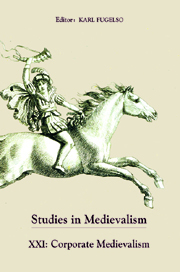Book contents
- Frontmatter
- Acknowledgments
- Contents
- Title in the Series
- Editorial Note
- I Corporate Medievalism: Some Perspective(s)
- II Interpretations
- Historicizing Neumatic Notation: Medieval Neumes as Cultural Artifacts of Early Modern Times
- Hereward the Dane and the English, But Not the Saxon: Kingsley's Racial Anglo-Saxonism
- From Romance to Ritual: Jessie L. Weston's Gawain
- The Cinematic Sign of the Grail
- Destructive Dominae: Women and Vengeance in Medievalist Films
- III Response
- Notes on Contributors
- Title in the Series
From Romance to Ritual: Jessie L. Weston's Gawain
from II - Interpretations
Published online by Cambridge University Press: 05 February 2013
- Frontmatter
- Acknowledgments
- Contents
- Title in the Series
- Editorial Note
- I Corporate Medievalism: Some Perspective(s)
- II Interpretations
- Historicizing Neumatic Notation: Medieval Neumes as Cultural Artifacts of Early Modern Times
- Hereward the Dane and the English, But Not the Saxon: Kingsley's Racial Anglo-Saxonism
- From Romance to Ritual: Jessie L. Weston's Gawain
- The Cinematic Sign of the Grail
- Destructive Dominae: Women and Vengeance in Medievalist Films
- III Response
- Notes on Contributors
- Title in the Series
Summary
Behind Romance, lies Folk-lore, behind Folk-lore lie the fragments of forgotten Faiths: the outward expression has changed, but the essential elements remain the same.
Jessie L. WestonJessie L. Weston at the Fin-de-Siècle
Jessie Laidlay Weston (1850-–1928), an oft-maligned figure of controversy, is best known for her influential study that blended folklore and Arthurian myth, From Ritual to Romance (1920). Weston was also an active scholar, prolific translator, and popularizer of Arthurian texts. Her translations and other studies have received little modern scholarly attention, yet they reveal across their entirety a coherent medievalizing project that sought to shift popular opinion about many of the keystones of Arthurian studies. This project became centered on one of the most debated figures in Arthurian romance: Sir Gawain. The purpose of this article is to draw the focus away from From Ritual to Romance, and back to Weston's earlier works in the last years of the nineteenth century and the early years of the twentieth: the studies with which she made her scholarly reputation. By examining Weston's popularizing translations alongside her more scholarly works, it will use her fascination with Sir Gawain to consider how she sought to reinterpret the literature of the Middle Ages, and to promote a particular vision of the legendary past.
- Type
- Chapter
- Information
- Studies in Medievalism XXICorporate Medievalism, pp. 119 - 144Publisher: Boydell & BrewerPrint publication year: 2012

